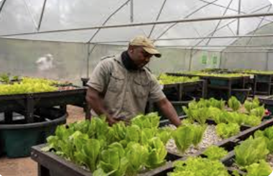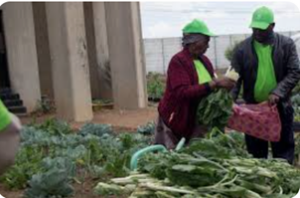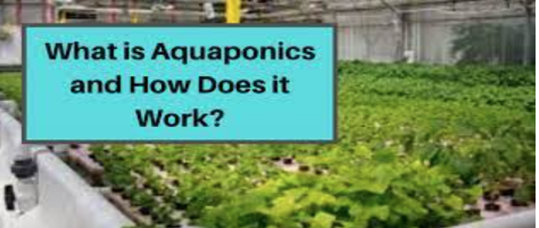“Aquaponics” farming is a sustainable and ethical method of farming that combines aquaculture (breeding, raising, and harvesting fish) and hydroponics. This method saves water and produces high – quality food. Aquaponics and hydroponic systems have numerous advantages over traditional soil – based production technologies.
 Aquaponics differs from Hydroponics in that it doesn’t need the addition of chemical nutrients for the plants, as waste from the fish provides the plants with nutrients. There is also no build – up of waste that causes the water to become toxic. In Aquaponics the bacteria in the waste converts ammonia into nitrates and nitrites, which the plants utilize as their main source of nutrients.
Aquaponics differs from Hydroponics in that it doesn’t need the addition of chemical nutrients for the plants, as waste from the fish provides the plants with nutrients. There is also no build – up of waste that causes the water to become toxic. In Aquaponics the bacteria in the waste converts ammonia into nitrates and nitrites, which the plants utilize as their main source of nutrients.
Aquaponics systems generally use 90% less water than other systems to grow the same volume of produce. They also don’t waste water, as it is recirculated. In addition, Aquaponic systems can be built on non-arable land. You can buy cheaper land for Aquaponics systems, and they can be erected close to cities, highways, and the market, saving a lot on transport costs.

Fish are a crucial part of the equation. They essentially feed the plants, and the solid fibers that remain after the filtering and mineralization processes that can be used to make compost for wicking beds. This means zero nutrient loss. The fish can be sold once they reach market weight, providing an additional source of income that covers most of the running costs.
What are the benefits of Aquaponics Farming:
- One of the benefits of aquaponics is that it makes it possible to have an intensive food production system that’s still sustainable.
- Aquaponics encompasses two agricultural products (fish and vegetables) being produced from one nitrogen source (fish food).
- Aquaponics is an extremely water-efficient system. In fact, Nelson and Pade say aquaponics only needs 1/6th of the water to grow 8 times more food per acre compared to traditional agriculture.
- Aquaponics doesn’t require soil and therefore it’s not susceptible to soil-borne diseases.
- Aquaponics doesn’t require using fertilizers or chemical pesticides.
- Aquaponics is a synonym for higher yields and qualitative production.
- Aquaponics means a higher level of biosecurity and lower risks from outer contaminants.
- Aquaponics allows a higher control (as it’s easier than soil control) on production leading to lower losses.
- Aquaponics can be used on non-arable lands such as deserts, degraded soil, or salty, sandy islands. Aquaponics creates little waste, as it mimics nature’s circular approach.
Aquaponics Farming Requirements
Aquaponics requires daily tasks, harvesting, and planting which are labor-saving and therefore can include all genders and ages.
- Aquaponics can integrate livelihood strategies to secure food and small incomes for landless and poor households.
- Aquaponics creates fish protein – a valuable addition to the dietary needs of many people.
- Aquaponics is a completely natural process that mimics all lakes, ponds, rivers, and waterways on Earth;
- From a nutritional standpoint, aquaponics provides food in the form of both protein (from the fish) and vegetables.
About Me

I help Agripreneurs in a variety of farming activities that also include professional farming plan and proposal writing services. Read More
Contact
Phone
Address
Website you Must Visit
Small Businesses and Agriculture play a vital role in building our economy, communities, and delivering the creativity that will move our country forward. The starting point to all of this is to develop a proper "Business Plan” that is necessary to show all interested parties – employees, investors, partners, and yourself – that you are committed to building your business. Creating your plan forces you to think it through and select strategies that will propel your growth.
Visit our website – www.premiumbusinessplans.co.za now for more details and professional help.

